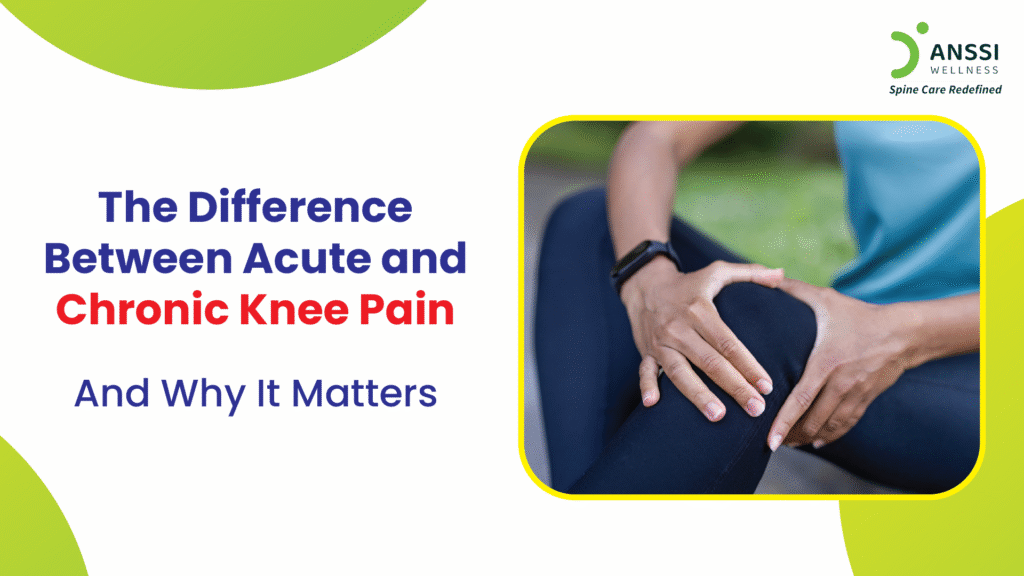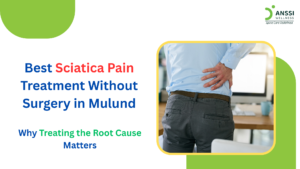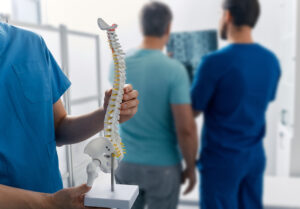Knee pain is one of the most common musculoskeletal complaints, affecting people of all ages, from young athletes to older adults. It can limit mobility, interfere with daily activities, and impact quality of life.
However, not all knee pain is the same. Understanding whether your knee pain is acute or chronic is crucial because the cause, treatment, and recovery process can vary greatly between the two. Recognising the difference can help you seek the right treatment at the right time, preventing further damage and ensuring faster relief.
Understanding Acute Knee Pain
Acute knee pain refers to pain that develops suddenly, often as a result of a specific injury or trauma. It can happen during sports, exercise, or even an everyday activity like climbing stairs or tripping on an uneven surface.
Common causes include:
- Ligament sprains (such as ACL or MCL injuries)
- Meniscus tears
- Bone fractures around the knee
- Patellar dislocation or subluxation
Symptoms typically involve:
- Sharp or intense pain
- Sudden swelling
- Redness or warmth in the knee
- Difficulty bearing weight or moving the joint
Acute knee pain often requires immediate care to control inflammation, prevent further injury, and restore function. The earlier it is addressed, the better the chances of a complete recovery.
Understanding Chronic Knee Pain
Chronic knee pain appears slowly and lasts for more than three months. It is often the result of ongoing wear and tear, degenerative changes, or old injuries that never healed completely. Unlike acute pain, which is sudden and sharp, chronic knee pain tends to be dull, aching, and sometimes accompanied by stiffness.
Common causes include:
- Osteoarthritis or rheumatoid arthritis
- Tendinitis or bursitis
- Cartilage degeneration
- Repetitive strain injuries
- Poor posture or muscle imbalances over time
Typical symptoms include:
- Persistent discomfort
- Stiffness, especially in the morning or after sitting for long periods
- Swelling that comes and goes
- Difficulty performing daily activities
Chronic knee pain often requires a long-term management plan, as it may not resolve with short-term rest alone.
Why the Difference Matters
Knowing whether you have acute or chronic knee pain is critical for accurate diagnosis and effective treatment. Acute pain often responds well to rest, ice, compression, and elevation, along with short-term medication or bracing. Chronic pain, on the other hand, typically requires targeted physiotherapy, lifestyle adjustments, and advanced non-surgical treatments to improve joint health and mobility.
Misdiagnosing or ignoring the nature of the pain can lead to complications. For example, untreated acute injuries can evolve into chronic issues, while persistent chronic pain left unaddressed may cause further joint degeneration.
Diagnosis often involves:
- Detailed medical history
- Physical examination
- Imaging (X-ray, MRI) to identify structural damage
- Functional movement assessments
Advanced Non-Surgical Solutions
While some severe knee injuries may require surgery, many cases, both acute and chronic, can be managed without invasive procedures. There are advanced, non-surgical treatments that are drug-free, injection-free, and highly effective.
For chronic knee pain, treatments such as Non-Surgical Knee Decompression can help if the pain is caused by knee issues like joint degeneration or osteoarthritis. Physiotherapy, targeted strengthening, posture correction, and lifestyle modifications can significantly reduce pain and prevent recurrence.
Lifestyle tips for healthier knees:
- Maintain a healthy weight to reduce joint stress.
- Incorporate low-impact exercises like swimming or cycling.
- Strengthen supporting muscles (quadriceps, hamstrings, glutes).
- Wear supportive footwear to maintain alignment.
- Avoid sudden high-impact activities without warm-up.
About ANSSI:
ANSSI Wellness focuses on improving the quality of life for patients suffering from knee issues, aiming to provide relief where other conventional treatments have failed. Through advanced non-surgical knee decompression treatment, ANSSI is committed to helping patients avoid surgery and recover in a safe, effective, and compassionate environment.
Connect with ANSSI Wellness on LinkedIn, Instagram, and Facebook for expert guidance.




